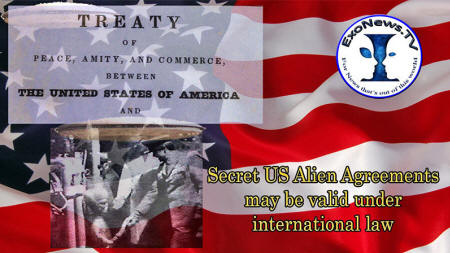|
|
|
from
Exopolitics Website
The legitimacy of secret agreements between the U.S. Government and alien civilizations may be valid under both U.S. and international law contrary to widespread public perceptions.
This shocking conclusion has emerged from legal research into the status of agreements reached by a sitting U.S.. President with the chief executive officer of a foreign power.
According to whistleblower testimonies that have been documented in the book, 'Galactic Diplomacy - Getting to Yes with ET,' President Dwight Eisenhower met with and reached agreements with representatives of at least two extraterrestrial civilizations.
According to Galactic Diplomacy, these secret agreements lacked legitimacy since they were never ratified by the U.S. Senate as required by the U.S. Constitution.
Article II.2, of the Constitution requires that any international treaty signed by the Executive branch needs the advice and consent of two thirds of the U.S. Senate:
Consequently, it was reasoned the agreements reached between President Eisenhower and the chief executive of an extraterrestrial delegation were questionable under U.S. law.
At best, it was reasoned that they were quasi-legal since they were only signed but not ratified as constitutionally required by Article 2.II:
Recent research has however discovered the legal concept and practice of an "executive agreement" that rules out such reasoning. According to the U.S. State Department website:
An "executive agreement" makes it possible for a U.S. President to reach an agreement with a foreign power without the advice and consent of the U.S. Senate.
Furthermore, under international law, executive agreements are recognized as valid, even if these have been conducted in secrecy. Also, the U.S., Supreme Court has ruled that executive agreements are valid, even if the U.S. Congress is not consulted.
In a case involving an Executive Agreement between President Roosevelt and the Soviet Union (United States v. Belmont 301 U.S. 324 [1937])the Supreme Court ruled in favor of the President’s power to sign executive agreements without consulting or gaining the consent of the U.S. Senate.
The reasoning for the decision from the perspective of one of Justices was summarized as follows:
The disturbing conclusion is that executive agreements signed by President Eisenhower and his successors with representatives of an extraterrestrial civilization may be legal under both international and U.S. domestic law.
The only caveat is if the executive agreement violates the U.S. Constitution, then the Supreme Court could strike it down. If an executive agreement is highly classified, however, then it is highly unlikely to be brought before the Supreme Court for adjudication.
This basically removes the sole known judicial mechanism for striking down an executive agreement signed by a U.S. President.
According to whistleblower testimony, in exchange for President Eisenhower giving aliens the right to,
...the U.S. received assistance in studying and reverse engineering alien technologies.
Consequently, the U.S. has participated in the development of a secret space fleet that operates in deep space, and conducts diplomatic relations with extraterrestrial civilizations.
According to one whistleblower, the secret space fleet is part of an organization called the "Earth Defense Force," while other whistleblowers call it "Solar Warden."
The idea that secret "executive agreements" reached by U.S. Presidents and extraterrestrial civilizations may be constitutional will come as a shock to many. Unfortunately, executive agreements are valid in international law and even recognized by the U.S. Supreme Court.
Consequently, there is likely to be an extensive number of secret "executive agreements" reached between the U.S., and perhaps even other governments, with representatives of extraterrestrial civilizations.
Urgent action needs to be placed on exposing these agreements to eliminate any wrong doing, and ensure that they comply with the U.S. Constitution, and International law and Human Rights standards.
|


